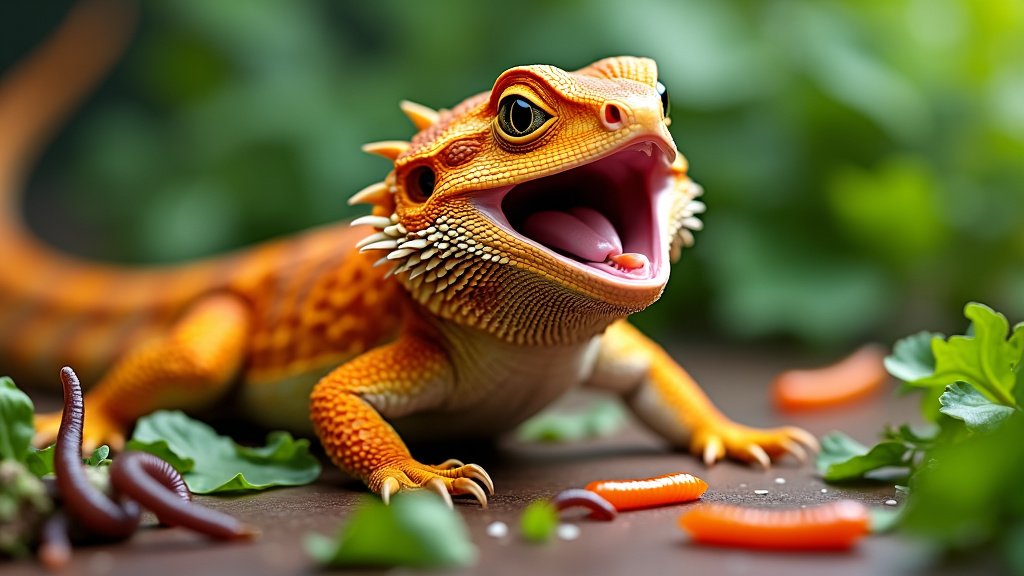Considering adding a bearded dragon to your family? These fascinating reptiles make wonderful pets and can quickly become the scaled apple of your eye. However, like any pet, they have specific dietary needs that are crucial to their health and well-being. If you’ve been around the pet store recently, you might have stumbled across superworms and kingworms (morioworms) and wondered – can my bearded dragon safely munch on these wriggly treats? Well, let’s dive in and find out!
Understanding Bearded Dragons’ Dietary Needs
Bearded dragons are omnivores, meaning they love a good mix of both plant and animal matter. Their diet should consist of a balanced combination of insects, leafy greens, and the occasional fruit treat. It’s like a super-healthy dragon buffet!
Now, I’ve been a bearded dragon owner for quite some time now, and over the years, I’ve fine-tuned the balance to keep my dragons in tip-top shape. It wasn’t always easy; there were some hit-and-miss meals (and the occasional stubborn refusal to eat anything green), but we got there eventually.
What Are Superworms (Zophobas morio)?
So, let’s start with superworms. These critters, scientifically known as Zophobas morio, are larger and longer than mealworms, packed with protein, and loved by many insectivorous reptiles. They’re essentially the steak of the insect world – fatty, juicy, and quite the treat for our dragons.
Benefits of Feeding Superworms
Superworms provide a high protein and fat content, which is great for growth and energy. But beware – too many can be a little like giving your dragon a constant diet of cheeseburgers. Moderation is key!
In my experience, my dragons get visibly excited at the sight of superworms. I can practically hear them thinking, “Oh, boy! Dinner’s served!” Watching them chomp down on these treats is a sight to behold.
Introducing Kingworms (Morioworms)
Next up, we have the kingworm, or morioworm. These hefty insects are also known for their nutritional value but differ slightly in size and composition from superworms.
What Makes Kingworms Special?
Kingworms are larger and a bit more challenging for some smaller dragons to handle. Nutritionally, they’re rich in protein and fat but have a better calcium-to-phosphorus ratio compared to superworms. Historically, they’ve been a staple for many reptile owners. As a seasoned dragon parent, I can recall being both curious and slightly apprehensive about offering them these jumbo wrigglers.
Comparing Superworms and Kingworms
Alright, let’s get down to the nitty-gritty. How do superworms and kingworms stack up against each other?
Nutritional Breakdown
- Protein: Both worms pack a punch, but kingworms tend to have a bit more.
- Fat: Superworms are the fattier option, which can be great for an energy boost but shouldn’t be overdone.
- Calcium-to-Phosphorus Ratio: Kingworms have a slight edge here, offering a better balance critical for your dragon’s health.
From my little food trials at home, I’ve noticed my dragons seem to prefer superworms for their easier chew factor. However, when it comes to digestion, kingworms might just have the upper hand.
Feeding Kingworms to Bearded Dragons
So, the million-dollar question: can your bearded dragon safely eat kingworms? The answer is a resounding yes – but with a few caveats.
Safe Feeding Practices
First off, size matters. Make sure the worm is not too large for your dragon. A good rule of thumb is to measure the worm against the space between your dragon’s eyes – if it fits, it’s a yes! Frequency is also key. Think of kingworms as a special treat, rather than a staple – perhaps a few times a week at most.
Overfeeding large insects can lead to impaction, a potentially serious condition where the food gets stuck in their digestive tract. To mitigate this risk, feed the worm in smaller portions and keep an eye on your dragon’s bathroom habits.
My Tips for Kingworm Introduction
- Start Small: Begin with a single worm and observe how your dragon handles it.
- Monitor Health: Keep an eye out for any signs of discomfort or impaction – if something seems off, consult your vet.
- Mix It Up: Balance kingworms with other food items to ensure a varied diet.
Health Considerations
When it comes to oversized prey items, general health considerations always come into play. Impaction can be a real concern, especially with younger or smaller dragons. Ensure your dragon is eating a well-hydrated and balanced diet to help mitigate this risk.
If in doubt, don’t hesitate to consult your vet. When it comes to our scaly friends, professional advice ensures they stay healthy and happy.
Alternative Insect Options
If kingworms and superworms aren’t your dragon’s cup of tea, there are plenty of other insect options to consider.
Safe Buggy Choices
- Crickets: The bread and butter of reptile diets – always a solid choice.
- Dubia Roaches: Packed with protein and low in fat.
- Phoenix Worms: Rich in calcium and perfect for smaller dragons.
- Occasional Treats: Wax worms and hornworms – just keep them as treats due to their high-fat content.
Personally, I’ve found that variety keeps my dragons happy and healthy. Rotating through different insects not only provides a balanced diet but keeps mealtime exciting.
Conclusion
So, can bearded dragons safely eat kingworms? Absolutely, but as with all things, moderation is key. Ensure they’re just one part of a varied diet and always keep an eye on your dragon’s health.
Remember to consult your vet if any dietary concerns arise. Our scaly companions rely on us to keep them healthy and happy, so let’s make sure we do it right.
Got a bearded dragon who’s a picky eater or a noodle lover with a tale to tell? Drop a comment below – we love hearing from fellow reptile enthusiasts! Sign up for our newsletter for more tips and tricks, and share this post with friends who might need a little help in the dragon dining department. Happy feeding from all of us at Dug’s Bugs!




